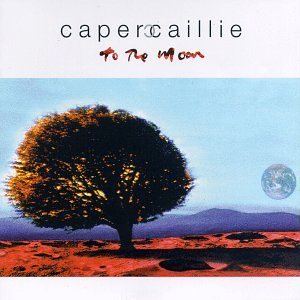 To the Moon was my first exposure to Capercaillie, so of course, it was what’s generally considered their “crossover” album. This is by no means a negative, or even something that’s very obvious: it’s more apparent in the rhythm patterns, the instrumentation (sorry, but no one is going to persuade me that the bouzouki is a traditional Scottish instrument), and the general treatment.
To the Moon was my first exposure to Capercaillie, so of course, it was what’s generally considered their “crossover” album. This is by no means a negative, or even something that’s very obvious: it’s more apparent in the rhythm patterns, the instrumentation (sorry, but no one is going to persuade me that the bouzouki is a traditional Scottish instrument), and the general treatment.
It all starts off with the title track, a combination of two songs, “A Nighean Donn” and “A Ghealaich,” both traditional as arranged by Capercaillie, and of course, sung in Scottish Gaelic. There’s a good dose of mystery in the opening, low chords with sporadic whispered vocals by Karen Matheson, before the track shifts into what can only be described as folk rock.
The feel continues through “Níl si I nGrá,” credited to Manus Lunny – another of those ballads in which Matheson wrings your heart out. It’s really a pop rendering, give or take the Gaelic lyrics. There is deft use of whistles here (courtesy of Marc Duff).
The mood shifts abruptly to “Why Won’t You Touch Me?” (by John Saich), an up-tempo and somewhat wounded love song. Somehow, it works – there’s good layering here, rich textures due mostly to the back-up vocals as well as the instrumentals, which are surprisingly lean. Matheson’s voice moves back and forth, from front to background, adding to the almost 3-D feel of the thing.
“You” (Donald Shaw/Charles McKerron) is another of those ballads that gets a full-dress pop treatment – rhythms, keyboards, guitars, a beautiful passage with solo fiddle over the “orchestra” to close the piece – and just for fun, alternates English and Gaelic lyrics.
“Eastern Reel,” the instrumental that closes the collection, is not what you expect from a reel. It takes off into areas that are, indeed, somewhat “eastern” in feeling, but also introduces sounds that almost enter the realm of electronica. It’s another one that makes your ears perk up.
I’m not going to do a track-by-track on this one; I think what I’ve outlined above gives a good sense of the range of this album, and that’s one of the key words with Capercaillie – “range.” I think one thing that impresses me is the way the band moves effortlessly from passages of a purely traditional sound to full-blown pop numbers.
I’ve noted elsewhere the magic of Karen Matheson’s voice. That’s in full evidence here, along with some adroit fiddling by Charlie McKerron, and the just-right accents (not to mention support) from guitars and other plucked strings (Manus Lunny and John Saich), keyboards, accordion (Donald Shaw), and the rest of their arsenal, as well as the very deft use of whistles and pipies (provided by guests Marc Duff, Fred Morrison [Highland small pipes] and Davy Spillane (uillean pipes]) and the solid drums and other percussion (guests Ray Fean and Wilf Taylor). It’s one of those albums where everything is just right, one in which you get sucked in by one track after another. I’m reminded of a comment about the language of Tolkien’s elves: “It was a language of wonder and delight.” That fits.
(Green Linnet, 1997)
